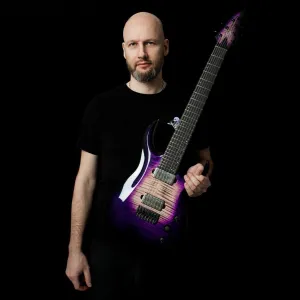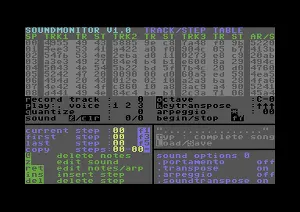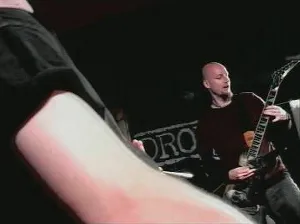An Interview with Romeo Knight
Published: 10/10/20
Key points of discussion are:
- Music on the Amiga
- Red Sector/TRSI
- Remixing c64 classics
- The use of real Instuments when remixing
1) Hi Romeo. Thanks for taking the time to participate in this Interview. Firstly, What was your introduction to computing?
I got a C128 when I was 14 years old (1985) which I basically only ran in C64 mode. But I had friends with e.g. Atari 2600 and C64 which actually sparked the interest in computers (and games of course) in general beforehand.
2) You're known for your fantastic music on the Amiga but did you tinker with any other computers musically? What was the attraction of the Amiga?
Yes, I started composing on said C128 using Chris Huelsbeck’s Soundmonitor but all of the about 20 SID tunes I created were lost - this was before I even knew about something called demos or the demoscene. The Amiga was the next natural step to move on to, and its sampling ability promised to open a whole new world of musical possibilities. I mean, it was jaw-dropping when just 2 years before you basically played music-less block graphic adventures.
3) What inspired you to make music on the Amiga?
Most obvious answer - other music and musicians, be it on computer platforms or in real life. In those days, I was very much into electronic pop music and being able to synthesize or sample your own sounds seemed to be the most fascinating thing in the world for me. But the actual decision to become
a musician was much earlier already during the C64 times, and Rob Hubbard for sure was a major part of the reason. As said above, changing over to Amiga was just a natural step in evolving my creative potential in composing and skills.
4) How did you get involved with Amiga Demo groups TRSI/Red Sector?
It’s hard to recollect precisely after so many years - but it was basically one of these knew someone from school who knew someone who was part of the scene
-stories. I went to school in Düsseldorf, the headquarters of Red Sector back then. I swapped disks with friends in the schoolyard, sometimes I met with people at their homes to copy cracked games, and this is how I eventually got introduced to Irata, Flynn or Hamster of Red Sector (hi guys!). Sometimes I brought my Protracker mods with me which often ended up in demos, so most of the time I didn’t even know which demos my tracks were used in. Which already leads to the answer of the next question…
Follow MeDemo. Music by Romeo Knight
5) What was the process for creating a tune for a demo? Did you see early work versions of the demo’s and composed your music for that? How did it work?
Apart from randomly using tracks of mine - sometimes they weren’t even finished but were used nonetheless - there were larger scope and better organized projects that needed more attention and planning. In these cases I got a briefing for what kind of music was needed or I was at least involved in the later production stages. Wicked Sensation
from 1992, which won the World Of Commodore competition that year, was one of these examples, or The Classic Demo
, rather unknown and done with a local team (with Skyhawk (graphics) and SMF (code)), for which I was involved in the concept and even contributed some graphics. But these were exceptions - most of the time the music was already existing and just got used because people liked it or found it fitting.
6) Did you realise at the time you were gaining a fan base? Hitting a similar status as your composing predecessors on the Commodore 64? Do you realise it now?
Back then, I wasn’t even very much into the scene. I was a geek, pretty unsecure in socializing and absolutely not keen on attending larger events with lots of people - although this changed to some extent the older I got. So, apart from the positive feedback I got from the guys I knew personally, I honestly didn’t care a lot about what happened outside of my personal realms. I guess I got talked into attending 3 different cracker/demo parties overall in these oldschool times. Being there was fun though as far as I remember.
Having abandoned the Amiga in 1994, all this changed when I dared to search Romeo Knight
on the internet around 2004. I was astonished that I found so many references about me and my Amiga music, how much of an impact Cream of the Earth
must have made and that I influenced a fair amount of other musicians. I honestly had no idea until then.
It only took until 2007 when Axel from Brainstorm(BRS) somehow got me to produce a PC demo soundtrack for them (Fairytale
). Not much later on, I got asked by norwegian musician Xerxes of BRS to accompany him on guitar for his live performance at Breakpoint 2008. Being there, performing, and meeting all these great people from different countries was a game changer for me, and maybe for the first time I actually fell in love with the scene (while it looked like a comeback for others 😊).
Cream of the EarthLive at breakpoint.
7) As with all computers at the time and the Amiga was no different there were limitations. What did you particularly like and dislike about the Amiga sound?
Oddly enough, there are actually more dislikes than likes about the Amiga sound for me in retrospective. Limitation was not an issue since having one channel more than on C64 felt like endless new possibilities 😊, and I already knew most of the composing techniques that are used to make up for a lack of channels before.
The huge upside - being able to sample any sound you could think of - was the biggest downside at the same time because without actual synthesizer functionality it meant you were simply forced to use samples. Amiga chip tunes usually sounded worse than C64 SIDs, so for me, there was no point in them. That said - samples sound static by definition and it takes either lots of memory or lots of CPU power to make up for it, both things an Amiga of that time didn’t have. Thus it needed quite some tricks and effort to make an Amiga mod sound dynamic, organic and pleasurable - all properties the SID sound somehow gave you inherently.
One thing I especially hated was the Amiga being advertised as coming with 4 channel stereo sound
which technically just wasn’t true. Stereo means you’re able to utilize a panning matrix to place your sound in the stereo panorama but this just wasn’t possible. Instead you had 4 sound channels hard wired to 2 physical output channels. You either had to live with the channels being hard-panned L/R (which sounds absolutely appalling IMO), sacrificing 2 channels by having one sound coming from two channels at the same time and using their levels to simulate a panorama setting (which nobody ever did) or mixing the 2 outputs to 2-channel mono with a special Y-cable or some piece of mixing hardware. It might sound weird but all my Amiga tracks got composed on the shitty mono speaker of my 1901 screen display I got with my C128.
8) Why did you exit the demo scene and computer music in general? Looking back would you have done anything differently? Maybe staying in the demo scene a bit longer?
My musical taste changed a lot in the 80s and early 90s, I listened to a lot of Hip-Hop and I started to find interest in metal music which also made me pick up a guitar around 1992-93. At that time I already had a small MIDI-Studio running at home with a couple of synths and samplers and an Atari Mega ST4 with Cubase 3.1.
Composing on Amiga didn’t have the allure of the earlier days and I couldn’t find a real motivation for it any more, except for a few game soundtracks I did before I abandoned the Amiga completely. As a music making platform it just felt outdated and limited, and the more I made progress with my guitar playing the more I wanted to play and perform with others. As said, I wasn’t very much connected to the scene, especially not emotionally, so it didn’t feel like I had lost something at that time.
If there is anything to regret, it’s that I didn’t follow-up in making game soundtracks, I somehow wasn’t really interested in it although I brought almost everything with me that was needed to start a successful career in game music. I guess I just wasn’t mature enough to see an opportunity in it, also lacking self-confidence for actively going into business like this.
9) After exiting the demo scene and computer music what track did you decide to follow musically?
Guitar became my thing. Teaching myself seemed easy and straightforward (apart from the computer music stuff I had some classical and profound theoretical background) and more importantly I had lots of time to practice. So I ended up playing guitar in several local bands the following years, mostly Crossover and Metal, which I do until today. Apart from some very cool live experiences, these bands never gained any attention outside the local music scene. Anyway, being on tour with friends and performing live in front of an audience often was enough fun to make it worth it.
10) After years being out of the scene. You came to remixing c64 classic sid tunes and for a period you were quite prolific. What was the attraction for you?
C64 SID tunes is where I’m coming from, it’s the seed of my active musical career, the origin of my increased interest in music in general. Finding out about the C64 remix scene was a great journey back in time, I had a huge blast browsing through the releases and exploring different styles and different takes on my favorite SID tunes. It just shows how powerful music can be as it just gave me the ultimate nostalgic trip into my musical youth again, no other medium is able to do this on such an emotional level IMO.
Since I was working as a professional audio engineer with my own studio facility in the meantime, there was no reason that prevented me from starting to produce my own remixes of my favorite SIDs, often based on certain guitar music styles. This was exciting to do since to me, a lot of SIDs actually do not sound like electronic computer music but more like songs trying to emulate a certain style of real
music, even though produced on a very limited digital platform. Reviving a SID in that style, recorded with real instruments, was the challenge that kept me going. The original Monty on the Run
is an obvious example, or my Bionic Commando
remix as well, since the original SID always sounded like latin music to me.
11) Most if not all of your remixes feature real instruments a far cry from your early electronic sounding mods on the Amiga. For you how important is it to use as many real instruments as possible?
It’s not important in an absolute sense but my take never was to create something sonically close to the original, just produced with today’s technology (although this can have its appeal, too). As said above, I wanted to take the remix to a new level. Still, staying true to the original feeling, not changing any chords or notes and keeping most of the structure (where it makes sense) was always extremely important to me. If you dare to check, lots of my remixes it will even feature the exact original tempo and/or key. That said, real instruments will always contain a level of natural dynamics and feeling that’s hard to achieve by just programming synths or plugins. And to put it simple, it made a clear distinction to those remixers that released half-assed remixes by clicking together a few loops and presets on their laptop. Somehow it was about competition as well. 😊
12) You’ve collaborated with many musicians on the c64 remixes. What is the process and how do you work together in creating a remix? Is working with others something that you think improves the listening experience?
Not entirely sure about the listening experience but the beauty in collaborating with other musicians always is the possibility to create something that develops outside of your own little box of creativity. In a perfect sense, a musical idea by someone else should inspire you in a way that adds to the mutual project which simply wouldn’t have been possible without the influence of the other. Playing in bands for so many years I learned to appreciate the input of others, but also when it’s important to fight for your own ideas. From this viewpoint, a collaboration of only two musicians seems like a simple, effortless task for me. And it’s just fun to interact with others in creative ways in general, especially if you appreciate them as a person as well.
I usually don’t ever have the audience’s reception in mind when composing or producing in general - except maybe when working on a Revision Streaming Music competition track. 😊
13) It’s interesting that you found your fame on the Amiga yet ALL of your 13 remixes are from the c64? Why is this? Have you considered ever remixing an Amiga mod? One of your own even?
It’s because of a phenomenon connected to the nature of the sound generation - samples vs. chippy synth. Through the use of samples. Amiga tunes are much more set for a very certain style - you can improve them in a technical way but there’s much less room for creativity when remixing IMO. Or you just need to change
stuff and end up being less true to the original which I’m not a fan of. SIDs - they’re more like a whiteboard with only a few bullet points that can be used as the basis for your own remix. On top, there are just so many more SID tunes I love and have nostalgic connections with.
Yes, I’ve considered remixing some of my own tunes but then, there’s that same problem. I actually started on a remix for Cream of the Earth
some years ago but after Firefox’s ultimate version - featuring yours truly on guitar - there’s just no sense in completing it any more. Btw, one of my early Amiga mods called Crack of Dawn
is actually a remix of one of my own SID tunes. 😊
14) 2010 saw your last remix. Is that it? Will you ever come back and do more?
I’d actually love to, there’s quite a few I had on my list when I was into it, but real life scheduling issues don’t leave much room for it right now. Although my two bands broke up at the end of 2019 and a lasting Corona downtime for live playing there’s still lots of musical stuff I do in- and outside the scene.
15) Finally, What does Romeo Knight do today?
I try to be as active in music as possible, it keeps me vital and young. 😊
Right now, me and a couple of friends are in the process of forming a new metal band again to be ready to play live once Corona crisis is over.
- I’m the guitar sidekick of an Electronica/Industrial/Ambient project called
Phasenmensch
and accompany him at live performances. - I try to take part in demoscene productions as much as my schedule allows, be it as a composer/producer or guitarist only.
- I occasionally produce soundtracks for independent games.
- I occasionally produce music for commercials.
My actual day job is producing audio for commercials which usually does not include the music though.
I’m a collector of electrical guitars and have quite a popular instagram channel with pictures of them @knight.romeo.
And I hope to play live at Revision Easter party in the future again. 😊
While Romeo seemed reluctant to accept or even notice his popularity on the Amiga scene, he did make a big impact on the Amiga music/Demo group stage. Years later, it did become more apparent with the advent of the internet. His second stint came as a c64 remixer and again impressed with his guitaring skills. Will their be a 3rd comeback? Well, just have to wait and see.
/Neil (Tas)















Comments